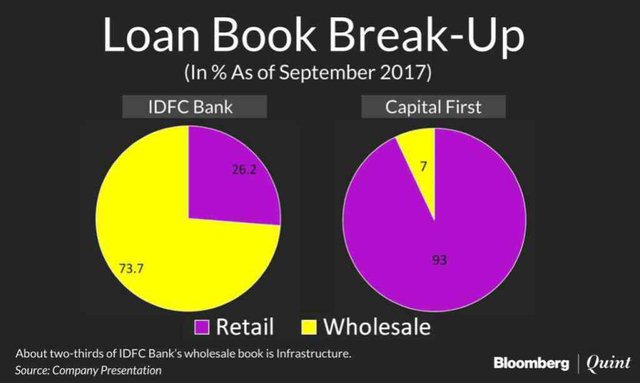The boards of the IDFC Bank Ltd. and Capital First Ltd., on Saturday, approved a merger between the two entities, creating a lender which will have a portfolio diversified across large corporate lending, small and medium enterprise loans and retail credit.
Shareholders of Capital First will get 139 shares of IDFC Bank for every 10 held, IDFC Bank said in a statement after its board meeting on Saturday.
V Vaidyanathan, founder and executive chairman of Capital First will take over as the chief executive officer of the bank post the merger. Rajiv Lall, who is currently the CEO of IDFC Bank, will move into the role of executive chairman, replacing Veena Mankar, who will continue on the bank’s board. The board also appointed Bipin Gemani as interim chief financial officer of IDFC Bank. Gemani was previously the CFO of IDFC Ltd.
“Capital First is getting an opportunity to test the fund at a source level, which is acting as a lower cost fund. NIM (net interest margin) is basically going to get protected on the higher side. IDFC Bank tends to benefit as well since they do not have retail SME (small and medium enterprises) portfolio and this could lead to valuation improvement,” said Deven Choksey, managing director, KRChoksey Investment Managers Pvt Ltd.
According to Asutosh Mishra, banking analyst at Reliance Securities Ltd, the merger ratio benefits Capital First more but in the medium to long term, the merger will benefit IDFC Bank more. On Monday, the Capital First stock may see a bigger spike, he added.
Also Read: Why IDFC Bank May Be Chasing A Merger With Capital First
This announcement is part of IDFC Bank's stated strategy of "retailising" its business to complete their transformation from a dedicated infrastructure financier to a well-diversified universal bank.

So far, IDFC Bank’s loan book has been skewed toward infrastructure lending, which contributed 47.5 percent of its total loans as of Sept. 30. This is the loan book that the bank inherited from its parent IDFC Ltd. when it received a banking licence from the Reserve Bank of India in 2014.
In comparison, Capital First had a retail loan book of Rs 22,974 crore with a customer base of three million and a distribution network of about 228 centres. Capital First also has a healthier asset quality. Its gross non-performing loans ratio stood at 1.63 percent as on Sept. 30, 2017.
IDFC Bank has reduced its gross non performing loans ratio to 3.9 percent after it sold off a chunk of bad loans to asset reconstruction companies in March 2017.
Hi! I am a robot. I just upvoted you! I found similar content that readers might be interested in:
https://www.bloombergquint.com/markets/2018/01/13/idfc-banks-board-approves-merger-with-capital-first
Downvoting a post can decrease pending rewards and make it less visible. Common reasons:
Submit